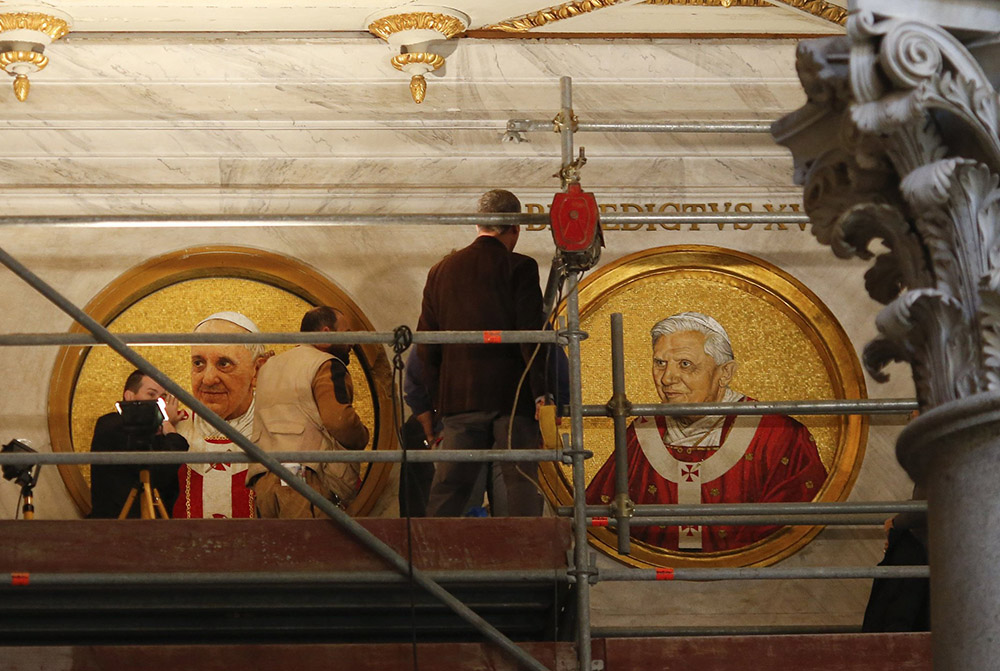The myopia of American Catholics has been on full display this week as they rush to canonize or demonize the late Pope Benedict XVI, and to contrast his time as pope with that of the current pontiff, Pope Francis.
Raymond Arroyo was on Fox News explaining, "We needed his voice, his clarity, especially now." The "now" implies a contrast with what conservative Catholics have complained is the "confusion" of Francis' pastoral style.
"You might say this is the definitive drawing down of the curtain on Vatican II," said Bishop Robert Barron of Winona-Rochester, Minnesota. You might, but you would be wrong. Barron seems not to realize that the universal church is in the midst of a synodal process that is, in its essence, about continuing the reception of Vatican II.
Ross Douthat, in The New York Times, opined that Benedict's resignation backfired:
What the resignation yielded, though, was not what Benedict had presumably expected ... the Francis pontificate was quickly defined by a sweeping push for liberalization, a striking shift of personnel and policy and a reopening of many of the 1970s-era debates that Benedict had tried to settle.
Yes, there have been some changes in personnel, and Francis, a pastor with a keen theological mind, approaches some issues differently from the way Benedict, a theologian with a pastoral heart, did.
What these three conservative voices miss is that for all the differences of style and approach, all popes do their best to articulate a Catholic response to the challenges of their times, not a liberal or conservative one. These would-be defenders of the Ratzingerian legacy ignore the obvious points of continuity between Benedict and Francis.

Workers install Workers install a mosaic depicting Pope Francis next to the one depicting Pope Benedict XVI in St. Paul's Basilica in Rome Dec. 9, 2013. (CNS/Reuters/Alessandro Bianchi)
Nowhere is that continuity more obvious than in the area of Catholic social teaching. Benedict "pushed the tradition forward on both ecological and economic justice," Meghan Clark, a theologian at St. John's University, told me via email.
"Caritas in Veritate may be an overly dense document, but it provides a clear bridge from John Paul II's cautions about unfettered capitalism and Francis's exposing structures of inequality and exclusion," she said. "What prompted George Weigel to rant about red and gold pens, at the core, was that."
Clark was referencing Weigel's criticism of Benedict's 2009 encyclical, Caritas in Veritate, in which Weigel tried to minimize certain themes in the text by suggesting Benedict had not really written them.
What becomes clear, as Italian theologian Massimo Borghese demonstrated in his book Catholic Discordance is that Weigel, joined by fellow neoconservatives Richard John Neuhaus and Michael Novak, tried to suggest Pope John Paul II was charting a new course in his 1991 encyclical Centesimus Annus. That text included a couple of paragraphs praising contemporary market economics for which the trio claimed credit. They hoped that section might have proven seminal. Instead, Benedict's Caritas in Veritate firmly shut the door on any doctrinal development along neoconservative lines.
Clark also points to another area where Benedict's writings resonated especially with those on the Catholic left.
"American Catholics struggle with the relationship between charity and justice," Clark said. "Charitable work is important but it is no substitute for building a more just society. Benedict XVI 's Caritas in Veritate provides no quarter for those who think charity or philanthropy are a sufficient response to injustice: 'I cannot give what is mine to the other, without first giving him what pertains to him in justice.' "
Anthony Annett, author of Cathonomics: How Catholic Tradition Can Create a More Just Economy, said Americans need to appreciate Benedict's past as a person who grew up in postwar Germany to understand his perspective.
No comments:
Post a Comment